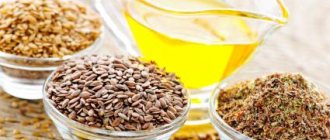>
Why flaxseed oil and flaxseed are good for our health. How to choose, store and how best to use.
Flaxseed oil comes from the seeds of the flax plant (Linum usitatissimum, L.).
Flaxseed oil contains Omega-3 and Omega-6 fatty acids essential for health. Flaxseed also contains a group of chemicals called lignans, which may play a role in cancer prevention. In fact, flaxseed is the richest plant source of lignans.
Flaxseed oil is most impressive when it comes to its fatty acid content. A typical serving size of one tablespoon of butter contains approximately:
- 120 calories
- 0.01 g protein
- 13.6 g fat
Like the seeds, flaxseed oil is rich in healthy omega-3 fatty acids, which are good for brain and heart health, improve mood, reduce inflammation, and improve skin and hair. Due to its nutty, slightly sweet taste, flaxseed oil can be used in cooking (unlike fish oil, which has a specific taste).
Flaxseed oil contains 50-60% omega-3 fatty acids in the form of alpha-linolenic acid (ALA). ALA, which is converted into eicosapentaenoic acid (EPA) and docosahexaenoic acid, which are omega-3 fatty acids. With ALA's even greater anti-inflammatory effects than fish oil, many people prefer the benefits of flaxseed oil over fish oil, especially vegetarians and people concerned about the mercury that can sometimes be found in low-quality fish oil.
A little about the composition
Flaxseed oil, as you might guess, is made from flax seeds using cold pressing. The temperature should be as low as possible, this helps preserve nutrients. As a result of pressing, a yellowish oily liquid is obtained that can be eaten. But it is important to remember that flaxseed oil deteriorates within a month after you start using it, so it is better to buy small bottles.
The flax seed product is a real storehouse of nutrients. It contains:
- polyunsaturated fatty acids: alpha-linolenic (Omega-3), linoleic (Omega-6), oleic (Omega-9);
- saturated fatty acids;
- tocopherol (vitamin E);
- phytohormones;
- minerals;
- lecithin.
Omega-3 is contained in prohibitive quantities: about 58%. The remaining two acids account for 15% and 17%, respectively. The product is quite high in calories, the energy value in 100 g of liquid is 884 kcal.
Due to the content of phytohormones, flaxseed oil is very beneficial for women's health. After taking the flax seed product, many noted that their hair became stronger and smoother, their nails stopped peeling, and their skin became moisturized.
A large amount of Omega-3 is the main advantage of the oil. In the kitchen of the average person there are many sources of Omega-6 (vegetable oil, margarine, fast food) and Omega-9 (canola and olive oil), while a sufficient amount of Omega-3 does not enter the body. As a result, a “distortion” is formed in the body, leading to obesity and other diseases.
Ideally, Omega-3, -6 and -9 should be supplied to the body in a ratio of 4:1:1. But this is only possible for residents of coastal regions; others are forced to take special dietary supplements. Flaxseed oil is beneficial because it contains an almost ideal ratio of Omega-3, -6 and -9.
Sources of inspiration and information
- Dietary a-Linolenic Acid, Marine x-3 Fatty Acids, and Mortality in a Population With High Fish Consumption: Findings From the PREvencion con DIeta MEDiterrianea (PREDIMED) Study Aleix Sala-Vila;
- Koh AS, Pan A, Wang R, Odegaard AO, Pereira MA, Yuan JM, Koh WP. The association between dietary omega-3 fatty acids and cardiovascular death: the Singapore Chinese Health Study. Eur J Prev Cardiol. 2015;22: 364–372;
- Guasch-Ferre M, PREDIMED study group. Frequency of nut consumption and mortality risk in the PREDIMED nutrition intervention trial. BMC Med. 2013;11:164;
- Guasch-Ferre M, Olive oil intake and risk of cardiovascular disease and mortality in the PREDIMED Study. BMC Med. 2014;12:78;
- www.pharmacognosy.com.ua;
Now you can order a calculation of an individual balanced diet and a step-by-step 21-day weight loss course “Fool your fat” at an amazing price
For only 39 $ instead of 60 $
If you do not need the doctor of our project to comment on the results of your tests, but for us to simply take into account the necessary indications and contraindications when preparing a slimming diet, then order your personal diet
Order a ration
CAUTION: Always consult your doctor when making any changes to your diet or lifestyle, as there may be contraindications in each specific case. The recommendations provided in this article are not a substitute for professional medical care, consultation, diagnosis, advice, or treatment. The author and publication do not accept responsibility for the results of any use of the above information.
About the dangers of flaxseed oil
After the previous paragraphs, it seems that flaxseed oil is an ideal Omega-3 product for the prevention of all diseases. But it has significant disadvantages:
- Flaxseed oil contains negligible amounts of vitamin E (tocopherol), which acts as a natural preservative. Few people know how long you can keep an open bottle of flaxseed oil in the refrigerator. Correct answer: no more than a month. Even if stored correctly, the liquid quickly goes rancid, which means that most of the oil in stores is already spoiled! This is one of the arguments in favor of the fact that it is better to buy a drug with a high content of Omega-3 in capsules.
- Spoiled flaxseed oil not only becomes tasteless. Oxidation produces free radicals, which have an extremely negative effect on the body. Due to its high peroxide content, the sale of flaxseed oil is prohibited in some European countries. For now you can buy it freely from us.
- Flax seed products should never be used for frying. During heat treatment, the oxidation process accelerates several times. The oil not only loses its beneficial properties, but also becomes simply dangerous.
Selecting high-quality liquid oil is extremely difficult; the production or storage process is often disrupted. A good oil, which contains only useful components, has the following properties:
- light nutty flavor (not bitter!);
- herbal aroma (the oil should not smell like oil paints or fish);
- When taken orally, there is no feeling of irritation in the throat.
It is difficult to say how many manufacturers make flaxseed oil according to all standards. High-quality oil is bottled in small opaque bottles with an airtight lid, which are then stored in the refrigerator. The benefits of the product directly depend on the production and storage conditions.
Benefits of fatty acids
Human brain cells are 60% fatty acids.
Most of them are synthesized in the body, but there are two essential acids that can only be obtained from food: alpha-linoleic and linoleic. With their deficiency, diseases such as hypertension, diabetes, cancer develop, vision and brain function deteriorate. But not all fats are good for the body. Most of them in the human diet are hydrogenated. On the contrary, they interfere with normal nutrition and cell function, contribute to increased cholesterol levels and deterioration of vascular function. Studies have shown that Omega 3 polyunsaturated fatty acids are very beneficial for the body. They improve the functioning of the brain and blood vessels. Most of these acids are found in flaxseed oil and fish oil. But their composition is slightly different. Fish oil contains long-chain acids that are most beneficial for humans. And flax oil is a source of alpha-linoleic acid.
Alternative options
Unfortunately, the features of the liquid flax product do not allow you to get the maximum benefit. To play it safe, it is better to buy a capsule dietary supplement. Lovers of natural oils should pay attention to camelina or mustard. You can add them to salads or drink a couple of spoons in the morning. The Omega three content in such products is slightly lower than in flax seeds, but you can simply use a little more camelina or mustard oil.
They are less likely to go rancid than flaxseed, but they also need to be stored correctly. Be sure to put the bottle in the refrigerator and keep it out of direct sunlight. The liquid should not have a bitter aftertaste and your throat should not feel sore afterwards. The aroma is pleasant, unobtrusive. If the bottle smells of fish or chemicals, this is a reason to throw away the product and buy a new one.
And yet, what is better: Omega-3 from fish oil or flaxseed oil? The first option is still preferable. Polyunsaturated acids from fish are well absorbed by the body and immediately begin to have a beneficial effect. But if you still need to buy oil, you need to choose brands with good reviews, or opt for the encapsulated version.
Why Not All Omega-3 Sources Are Effective
The first studies of the effect of omega-3 on the body were carried out by analyzing the cuisine of the Greenlandic Eskimos, who practically did not suffer from cardiovascular diseases and atherosclerosis. Their diet consisted of algae, as the initial source of omega-3, and raw fish, which feed on these algae.
There is a significant difference between fresh fish oil and the processed fish oil you can buy at the pharmacy. In the first case, omega-3 is preserved and therefore is able to protect blood vessels and the heart from damage; in the second, it is practically devoid of its beneficial properties. The fact is that omega-3 quickly decomposes when heated and in contact with air, does not tolerate long-term storage and is very sensitive to light. Even slight heating can lead to oxidation with complete loss of beneficial properties.
For Eskimos, the issue of retained omega-3 is resolved by eating raw fish, but this dish is clearly not suitable for our menu.
conclusions
- To be healthy and live long and happily, you need to eat both plant and marine Omega-3s. This will reduce the risk of death from all factors by approximately 40% (subject to the general principles of a healthy diet);
- Failure to comply with optimal amounts of Omega-3 leads to the fact that even a healthy diet practically does not prolong life and does not bring the desired health;
- The optimal amount of marine Omega-3 is 1 to 1.5 g per average eater per day. This roughly corresponds to 3 to 4.5 g of fish oil (1.5 to 3 teaspoons or the corresponding number of capsules);
- Scientists consider the optimal dose of plant Omega-3 (alpha and gamma linolenic fatty acids) to be 0.7% of total calorie intake;
- The total dose of all Omega-3s should not exceed 4 g/day;
- The only sources of marine Omega-3 are fish oil and fish;
- Plant sources of Omega-3 include nuts, flaxseed, some oils and some fruits, vegetables, greens, grains and legumes.
Harm to the body
The oil should be used with caution by diabetics, although in most cases it helps them. About one in a hundred people with diabetes have an intolerance to flaxseed oil.
During pregnancy, oil should be used only after consultation with a doctor or on his recommendation. Because it can negatively affect hormonal levels.
The oil may harm people with gastrointestinal diseases. Especially for those who have problems with the acidity of gastric juice. Therefore, they should also consult a specialist before using this product.
Differences in contraindications
Despite the fact that nutritional supplements containing fatty acids are very similar in composition, the presence and nature of many diseases make significant differences between them. If you have eye diseases, before purchasing the supplement, you should consult your doctor and find out which is better: fish oil or flaxseed oil. The fact is that the first remedy has a positive effect on vision, while the second is not prescribed for inflammatory processes of the cornea of the eyes.
Flaxseed oil is not prescribed for cholecystitis, stomach diseases, polyps of the female organs, cholelithiasis and, in frequent cases, pancreatitis.
The following diseases are contraindications to fish supplements:
- tuberculosis;
- increased calcium levels in the blood;
- excess vitamin D;
- renal failure;
- stones in the gall bladder and urinary ducts;
- dysfunction of the thyroid gland;
- peptic ulcers of the digestive system;
- pregnancy.
Flax oil should not be heated or added when cooking, as it can cause poisoning.
If the dosage of both substances specified in the instructions is violated, diarrhea and nausea may occur.

Storage rules
The shelf life of flaxseed oil is usually from one to one and a half months. It is best to store the product in a darkened cabinet or pantry, avoid direct exposure to sunlight. Therefore, it is better to give preference to oils that come in dark glass bottles. This not only protects the oil from the sun, but also speaks of the integrity of the manufacturer.
Another useful recommendation is to let the product sit after purchase. To do this, you need to pour it into an open container and place it in a dark room. Thanks to this method, the oil will be better absorbed.
Fish, Flax, Borage, 1200 mg from Nature's Bounty
Nature's Bounty, Fish, Flax, Borage, 1200 mg, 72 Fast Release Softgels
from 919 ₽
Country: USA.
Available in quick-release soft tablets. The package includes 72 capsules, which equals 24 servings. The optimal daily dose is 3 tablets. The composition includes Omega 3-6-9 complex in the amount of 3.6 g per serving. Main components: fish oil, flax and buranchik oils.
According to reviews, no negative effects from taking the drug were found. While most buyers consider it effective.
Fish oil: benefits and harms
Fish oil is oil that is obtained from fatty fish or cod liver.
- Fish Oil – you will see this inscription if the fat is obtained from fatty fish.
- Cod Liver Oil – and this one, if it’s from cod liver.
It is used as a dietary supplement, in which Omega-3 fatty acids have a significant effect (we will talk about them below).
As a rule, fish oil is produced in the form of capsules, which are quite soft to the touch. In any case, I haven’t seen it in liquid form for a long time.
The difference between Fish Oil and Cod Liver Oil is that cod liver oil (Cod Liver Oil) contains vitamins A and D in addition to fats, while fatty fish oil (Fish Oil) contains only fats.
Those. in the case of Fish Oil, there is practically no risk of getting hypervitaminosis of vitamin A if you use it for a long time.
Beneficial properties specific to fish oil
Fish oil has been linked to several other benefits.
For example, fish oil has been shown to improve symptoms of several mental disorders, including depression, bipolar disorder and schizophrenia.
Additionally, fish oil may help treat behavioral disorders in children.
Numerous studies have linked fish oil supplements to decreased hyperactivity and aggression, and improved alertness in young children.
Conclusion:
Fish oil may be helpful in relieving symptoms of some mental illnesses in adults and behavioral disorders in children.
Differences in indications
When it comes to diseases, a person may be faced with a serious choice: which is better - fish oil or flaxseed oil. Some examples show that nutritional supplements should not be used unless prescribed by a doctor. Only a qualified specialist can determine which one is better in each specific case.
Fish oil helps reduce blood clotting. This property may have opposite effects in various diseases. It can be negative if a person has suffered from an injury and started bleeding. For people with ailments such as hemorrhoids, too much blood clotting can become dangerous. For such problems, fish oil, on the contrary, will have a beneficial effect.
The acids found in fish oil are absorbed much faster. For this reason, it may be prescribed for problems such as increased triglyceride levels in the blood. However, in chronic pancreatitis, consuming fish oil can lead to exacerbation. Sometimes flax oil comes to the rescue. It is a suitable alternative, but should be taken with caution if you have pancreatic disease. In no case should you exceed the dosage and course of treatment prescribed by a specialist.

The best sources of healthy omega-3

The most optimal source of omega acids in their natural form is not oils, but flax seeds. Vegetable oil is, in any case, already a processed product, and whether it contains omega-3 is unknown, since it largely depends on how the oil was produced and how long it was stored. Therefore, it makes sense to pay attention to whole flax seeds. They have a very dense protective shell, which allows us to think about the complete safety of omega-3. It is better to consume flax seeds in 2 ways.
- Chew thoroughly when dry. Dosage – up to 1 teaspoon. You should not eat a lot of dry seeds - everything is good in moderation. And if there is a suspicion of the presence of gallstones, then it is better to move on to the second option.
- Soak 1 tbsp. l. flax seeds overnight in a glass of warm water, chew, swallow, drink the liquid. This option is not only a source of omega-3, but also works well for heartburn and constipation.
Flax seeds are the most affordable product that can be bought both at the pharmacy and in the supermarket. Less accessible and less common are chia seeds. They can be consumed in the same way as flax seeds. These are optimal sources of omega-3, and we can say with confidence that with the correct use of these products, the body will definitely receive beneficial PUFAs.
Concomitant use
Taking into account the different composition of the products under discussion, it is sometimes advisable to combine them. However, such a decision must be determined by the attending physician. Fish oil and flaxseed oil can be taken together in the following cases:
- There are situations when a patient is prescribed flaxseed oil as an auxiliary medication to the main course of treatment. For any reason, recommendations may be revised. For example, the patient underwent a more in-depth examination, resulting in the need for new appointments. Sometimes your doctor may recommend taking fish oil and flaxseed oil at the same time. This is the case when the latter is not able to supply the body with the missing acids.
- If the fat is obtained from fish species that may contain mercury, then the combined use of beneficial supplements is also recommended. Since flax oil has antioxidant properties, it is prescribed to neutralize harmful substances.

Beneficial substances in flax oil

How to lose weight easily
You can also take into account that flaxseed oil has an excellent effect on the colon and has a laxative effect. This oil is great for keeping your digestive system moving. Helping your body get rid of toxic waste and feces faster. This will help your body cleanse itself and lose extra pounds.
A 2015 study by Nutrition Journal found that flaxseed oil added to people's weight loss diets not only helped study participants lose weight, but also significantly improved their well-being by reducing inflammation in the body.
This shows that consuming small amounts of flaxseed oil as part of a weight loss diet can lead to additional benefits in addition to shedding extra pounds.
Effective on constipation and diarrhea
Constipated bowel movements occur more slowly than the typical movement of food waste through the digestive tract. They are usually accompanied by a number of painful symptoms, such as bloating, gas, lower abdominal pain or constant fatigue.
One of the effective folk remedies for relieving constipation was flaxseed oil. Acting as a lubricant for the colon, flaxseed oil has been used as a mild relief from constipation.
Moreover, despite the benefits of flaxseed oil for constipation, it has also been used in people suffering from diarrhea.
A scientific study in the journal Ethnopharmacology conducted in 2015 showed that the oil has double effectiveness in relieving constipation and stopping diarrhea.
Acts on cancer cells
In the modern world of cancer treatment and also its prevention, flax oil is in demand and is included in therapeutic diets. Research has shown that flaxseed oil may help reduce the growth of breast tumors in women.
One study conducted that same year found that alpha-linolenic acid (ALA), found in flax oil, reduced the growth of breast cancer cells in women.
Another study in the journal Nutrition and Cancer supports the use of flaxseed oil as a cost-effective adjunctive therapy in the treatment of breast cancer.
The study indicated that the ALA in flaxseed oil inhibits the growth of cancer cells and causes their breakdown, leading to shrinkage of tumors.
Effective on cellulite
Trying to find the perfect method to combat cellulite? As we age, collagen production decreases, but consuming flaxseed oil counteracts this effect and helps increase collagen production.
Structural and age-related changes in skin tissue, including loss of collagen, make your cellulite more noticeable. This is also facilitated by the fact that your skin becomes thinner and loses its ability to hide defects caused by fine fat and connective tissue located below its surface. Incorporate a small amount of flax or seed oil into your diet and you can really fight the appearance of cellulite.
Effects eczema
Eczema is a non-contagious inflammatory skin condition in which the skin becomes dry, red, itchy, blistering or inflamed.
It is usually caused by an allergic reaction to foods, chemicals, or other substances such as laundry detergents or soaps. In addition to avoiding consuming harmful skin care products, you can also significantly improve eczema skin conditions by consuming flaxseed oil in your diet.
The substances that make up flaxseed oil help relieve inflammation and promote rapid healing of skin wounds if you use flaxseed oil for external use.
Promotes Heart Health
There is also evidence that eating foods high in ALA, such as flaxseed oil, may have beneficial effects on heart disease.
One study found that people consuming a diet high in ALA were less likely to develop fatal cardiovascular disease.
And another study found that women who consumed foods high in ALA (1.5 grams per day) had a 46% lower than expected risk of sudden death from heart failure than those who consumed more. low amount of ALA (about 0.5 grams per day).
Therefore, the more people eat foods with alpha-linolenic acid, the less they suffer from fatal heart disease.
Use for patients with Sjögren's syndrome
Sjogren's syndrome occurs when the immune system fails and is characterized by two most typical symptoms: dry eyes and dry mouth. A number of studies to date suggest a link between diet and disease development.
One such study analyzed whether flaxseed oil taken orally could help patients with Sjögren's syndrome. The results showed that therapy with flaxseed oil capsules (2 grams per day) reduces burning sensation in the eyes, and therefore can reduce inflammation of the mucous membrane.
It is very important that the cholesterol content in flaxseed oil is 0%!
Flaxseed oil produced by cold pressing contains a very useful composition. Many vegetable oils people buy contain healthy fatty acids, but such a unique combination as in flaxseed oil has not been found anywhere.
Flax oil and fish oil: comparing properties
Fish oil or flaxseed oil - both components are sources of essential Omega acids. And this is the only thing that unites them. Otherwise, the additives have different characteristics (see table).
Table. Fish oil and flaxseed oil - comparison
| Category | Fish fat | Linseed oil |
| Omega-3 content (Ω-3), g | 13.4 (herring), 19.7 (cod liver) | 53 |
| Benefit | Prevents a number of diseases of the cardiovascular system. It is used for medical purposes for anemia, rickets and for recovery after serious illnesses. Increases serotonin levels. Improves the functioning of the gastrointestinal tract. Lowers cholesterol levels. | Normalizes digestion. Prescribed for inflammation of the oral cavity, diseases of the cardiovascular system, liver and gastritis. It is used for figure correction and in home cosmetology. It alleviates the consequences of burns, has regenerative properties, and treats joint diseases. |
| Omega-6 content, g | 1.15 (in herring) 0.93 (in cod liver) | 17 |
| Balance Omega-3:Omega-6 | 1:0.09 (in herring) 1:0.05 (in cod liver) | 1:0,3 |
| Composition of other nutritional components | Vitamins A and D, as well as iodine, sulfur, bromine, phosphorus (in minimal quantities) | Vitamin E (tocopherol), lignans, folic acid (B9) |
| Absorption by the body Ω-3, g | 8,3 | 3 |
Important information! The ideal balance of Omega-3 to Omega-6 is 1 to 3.
How was the degree of assimilation calculated? Let's look at the formula in detail. Omega-3 is made up of 3 essential fatty acids (FAs):
- docosahexaenoic acid - DKG or DHA;
- alpha-linoleic - ALA or ALA;
- ecosapentaenoic acid - EPA or EPA.
When reading the composition of flax seed oil (linseed oil), you will find the ALA content. This acid is converted into DKG and EPA by the body independently. EPA/DKG is observed in marine fat (fish oil).
What difference does it make what kind of LCD we will receive? ALA is synthesized exactly into DHA and EPA. The fact is that alpha-linoleic acid is converted into ecosapentaenoic and docosahexaenoic acids with a reduced concentration. This fact is proven by the following data:
- 100 g fat = 25 g (approximately) DKG + EPA.
- 100 ml oil = 60 g (average amount) ALA.
- Reduction factor for ALA synthesis in DCG and EPA = 5% (approximately).
The initial values are known, let's move on to the calculations:
- Omega-3 digestibility due to oil. 60 g (ALA) * 5% (ratio) = 3 g.
- Digestibility of Ω-3 due to consumption of fish oil. 25 g (DHA/EPA) / 3 g = 8.3 g.
We get a comparison of FA absorption by the body:
- Linseed oil – 3 g.
- Fish oil - 8.3 g.
Flax oil contains more Omega-3. However, due to the low concentration of conversion of ALA to DHA/EPA, we get more omega nutrients from fish oil.
Which is better, fish oil or flaxseed oil - the answer is not clear. Both products are first-class sources of essential fatty acids. It’s just that to saturate the body with Ω-3, more vegetable extraction will be required.
On a note! Flaxseed oil is widely used in cooking. Season salads with it, add it to baked goods, etc. Healthy food is the best way to get vitamins.
21st Century Triple Omega Complex 3-6-9
21st Century, Triple Omega Complex 3-6-9, 180 Enteric-Coated Softgels
from 1,042 ₽
Country: USA.
The packaging includes 180 and 90 enteric-coated gelatin capsules. The drug is taken 1 tablet three times a day with meals. Each capsule contains 1 g of vital omega acids.
Consumers highlight a number of advantages: economical packaging, natural composition, comfortable reception and high quality.
Sources
- https://FB.ru/article/273443/chto-luchshe—ryibiy-jir-ili-lnyanoe-maslo-sostav-poleznyie-svoystva-deystvie
- https://formulazdorovya.com/2014584021181270926/rybij-zhir-lnyanoe-maslo-ili-semena-lna-vybiraem-luchshij-istochnik-omega-3/
- https://natulife.ru/pitanie/nutrienty/bzhu/omega/rybij-zhir/fish-oil-ili-lnyanoe-maslo
- https://snow-motion.ru/rybij-zhir-polza-i-vred.html
- https://www.magicworld.su/zdorove/1353-l-nyanoye-maslo-ili-rybiy-zhir.html
- https://www.syl.ru/article/364148/chto-luchshe—ryibiy-jir-ili-lnyanoe-maslo-sravnenie
- https://ya-krasotka.com/1983315306624059754/rybij-zhir-lnyanoe-maslo-ili-semena-lna-vybiraem-luchshij-istochnik-omega-3/
- https://moveat.expert/stati/rybij-zhir-i-lnyanoe-maslo-pochemu-ih-nado-est-vmeste/










